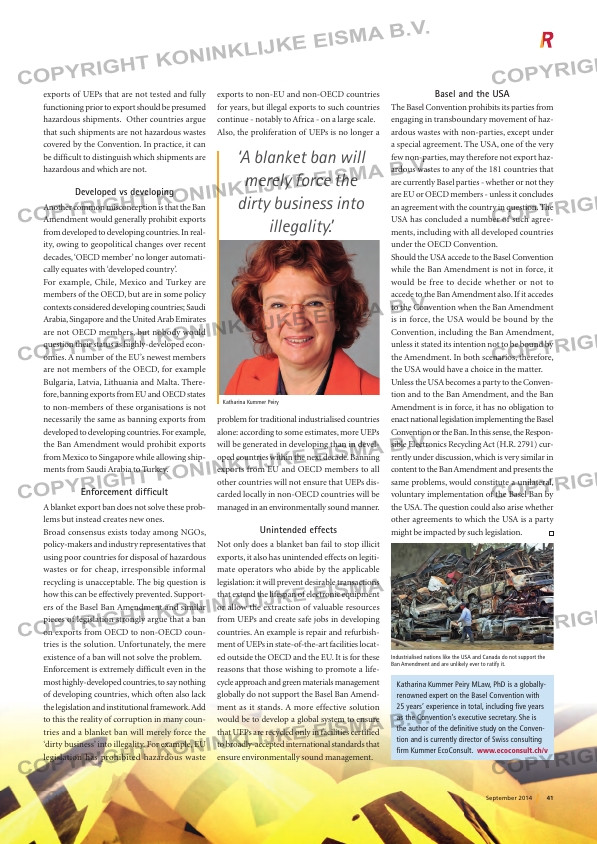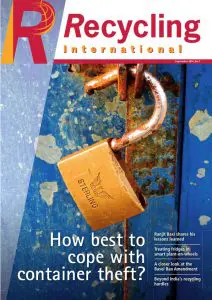Page 41 from: September 2014

41September 2014
exports of UEPs that are not tested and fully
functioning prior to export should be presumed
hazardous shipments. Other countries argue
that such shipments are not hazardous wastes
covered by the Convention. In practice, it can
be difficult to distinguish which shipments are
hazardous and which are not.
Developed vs developing
Another common misconception is that the Ban
Amendment would generally prohibit exports
from developed to developing countries. In real-
ity, owing to geopolitical changes over recent
decades, ‘OECD member’ no longer automati-
cally equates with ‘developed country’.
For example, Chile, Mexico and Turkey are
members of the OECD, but are in some policy
contexts considered developing countries; Saudi
Arabia, Singapore and the United Arab Emirates
are not OECD members, but nobody would
question their status as highly-developed econ-
omies. A number of the EU’s newest members
are not members of the OECD, for example
Bulgaria, Latvia, Lithuania and Malta. There-
fore, banning exports from EU and OECD states
to non-members of these organisations is not
necessarily the same as banning exports from
developed to developing countries. For example,
the Ban Amendment would prohibit exports
from Mexico to Singapore while allowing ship-
ments from Saudi Arabia to Turkey.
Enforcement difficult
A blanket export ban does not solve these prob-
lems but instead creates new ones.
Broad consensus exists today among NGOs,
policy-makers and industry representatives that
using poor countries for disposal of hazardous
wastes or for cheap, irresponsible informal
recycling is unacceptable. The big question is
how this can be effectively prevented. Support-
ers of the Basel Ban Amendment and similar
pieces of legislation strongly argue that a ban
on exports from OECD to non-OECD coun-
tries is the solution. Unfortunately, the mere
existence of a ban will not solve the problem.
Enforcement is extremely difficult even in the
most highly-developed countries, to say nothing
of developing countries, which often also lack
the legislation and institutional framework. Add
to this the reality of corruption in many coun-
tries and a blanket ban will merely force the
‘dirty business’ into illegality. For example, EU
legislation has prohibited hazardous waste
exports to non-EU and non-OECD countries
for years, but illegal exports to such countries
continue – notably to Africa – on a large scale.
Also, the proliferation of UEPs is no longer a
problem for traditional industrialised countries
alone: according to some estimates, more UEPs
will be generated in developing than in devel-
oped countries within the next decade. Banning
exports from EU and OECD members to all
other countries will not ensure that UEPs dis-
carded locally in non-OECD countries will be
managed in an environmentally sound manner.
Unintended effects
Not only does a blanket ban fail to stop illicit
exports, it also has unintended effects on legiti-
mate operators who abide by the applicable
legislation: it will prevent desirable transactions
that extend the lifespan of electronic equipment
or allow the extraction of valuable resources
from UEPs and create safe jobs in developing
countries. An example is repair and refurbish-
ment of UEPs in state-of-the-art facilities locat-
ed outside the OECD and the EU. It is for these
reasons that those wishing to promote a life-
cycle approach and green materials management
globally do not support the Basel Ban Amend-
ment as it stands. A more effective solution
would be to develop a global system to ensure
that UEPs are recycled only in facilities certified
to broadly-accepted international standards that
ensure environmentally sound management.
Basel and the USA
The Basel Convention prohibits its parties from
engaging in transboundary movement of haz-
ardous wastes with non-parties, except under
a special agreement. The USA, one of the very
few non-parties, may therefore not export haz-
ardous wastes to any of the 181 countries that
are currently Basel parties – whether or not they
are EU or OECD members – unless it concludes
an agreement with the country in question. The
USA has concluded a number of such agree-
ments, including with all developed countries
under the OECD Convention.
Should the USA accede to the Basel Convention
while the Ban Amendment is not in force, it
would be free to decide whether or not to
accede to the Ban Amendment also. If it accedes
to the Convention when the Ban Amendment
is in force, the USA would be bound by the
Convention, including the Ban Amendment,
unless it stated its intention not to be bound by
the Amendment. In both scenarios, therefore,
the USA would have a choice in the matter.
Unless the USA becomes a party to the Conven-
tion and to the Ban Amendment, and the Ban
Amendment is in force, it has no obligation to
enact national legislation implementing the Basel
Convention or the Ban. In this sense, the Respon-
sible Electronics Recycling Act (H.R. 2791) cur-
rently under discussion, which is very similar in
content to the Ban Amendment and presents the
same problems, would constitute a unilateral,
voluntary implementation of the Basel Ban by
the USA. The question could also arise whether
other agreements to which the USA is a party
might be impacted by such legislation.
Katharina Kummer Peiry MLaw, PhD is a globally-
renowned expert on the Basel Convention with
25 years’ experience in total, including fi ve years
as the Convention’s executive secretary. She is
the author of the defi nitive study on the Conven-
tion and is currently director of Swiss consulting
fi rm Kummer EcoConsult. www.ecoconsult.ch/v
Industrialised nations like the USA and Canada do not support the
Ban Amendment and are unlikely ever to ratify it.
Katharina Kummer Peiry
‘A blanket ban will
merely force the
dirty business into
illegality.’
RI-7 Basel Convention.indd 41 01-09-14 09:21



